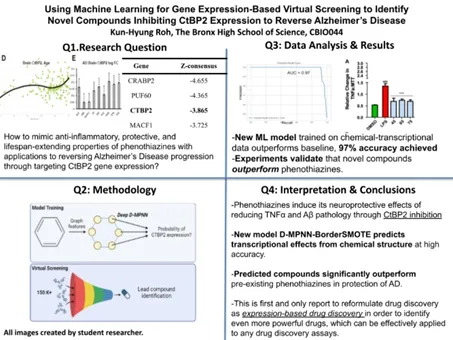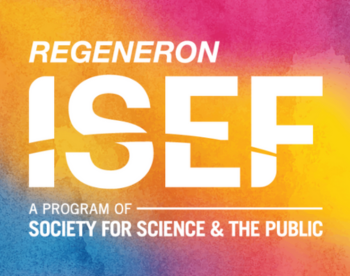Regeneron ISEF 2024 CBIO First Award: Highlights and Analysis
In the previous article, Embark Tutor analyzed the winning projects in the Cellular and Molecular Biology (CELL) category in detail. Today, we will continue to explore the winning projects in the Computational Biology and Bioinformatics (CBIO) category of the 2024 ISEF Global Finals to see how these outstanding research stood out from the fierce competition.
In 2024 ISEF Global Finals, the Computational Biology and Bioinformatics (CBIO) category mainly studies the use of computational technology and bioinformatics methods to analyze and interpret biological data such as genomes, proteins, and metabolic networks. These studies help reveal biological processes and disease mechanisms and promote personalized medicine and biotechnology innovation. This field promotes interdisciplinary collaboration and scientific discovery by integrating biology and computer science.
In this field, Embark's team of teachers has rich experience and expertise, and they will combine practical experience and cutting-edge technology to provide students with comprehensive guidance and support. Through ISEF personalized coaching and practical projects, we are committed to cultivating students' in-depth understanding and innovative thinking in the fields of computational biology and bioinformatics, helping them achieve outstanding achievements in ISEF competitions and contribute to future biotechnology and medical innovations.
In this article, Embark tutor made a detailed analysis of the CBIO first prize project, aiming to provide readers with more thinking angles and learning resources, hoping to inspire inspiration and learn from each other.
- Project Name
CBIO044 - Chemically Reducing CTBP Transcription Reverses AD

- Project Introduction
This project proposes an innovative drug discovery method for Alzheimer's disease (AD), a current medical problem. The researchers developed a target identification scheme that can quickly evaluate the effects of drugs on gene expression in human cells. During the study, they found that inhibiting the CtBP2 gene is one of the important mechanisms for the protective effect of phenothiazines. However, due to the complex and unstable structure of the CtBP2 protein, traditional drug development methods face challenges.
To overcome this challenge, the researchers shifted the drug discovery paradigm from structure-based screening to expression-based screening, which focuses on the effect of drugs on mRNA gene expression rather than just the physical and chemical binding of drugs to proteins. To this end, they created a new machine learning model that can accurately predict in extremely unbalanced datasets, thereby discovering new compounds that can transcriptionally inhibit CtBP2.
These new compounds showed superior effects to phenothiazines in eliminating microglial inflammation and paralysis in C. elegans, and are expected to provide new strategies for the treatment of Alzheimer's disease. In addition, the project also demonstrated a general and efficient drug discovery method that can be widely used in any high-throughput drug screening experiment, bringing new breakthroughs and hope to the field of pharmaceutical research and development.
Regeneron ISEF 2024CBIO First Award-Analysis
This Regeneron ISEF Award-Winning Project proposed a new drug discovery strategy for Alzheimer's disease (AD), for which there is currently no effective treatment. Through research, the project team discovered the inhibitory effect of a protein called CtBP2, whose age-related increase in expression is associated with the onset of AD.
In order to overcome the drug development challenges brought by the complex structure of CtBP2, the team innovatively adopted a screening method based on gene expression instead of traditional structure-based drug design. By building a machine learning model that can accurately predict in imbalanced data, the project successfully discovered new compounds that can transcriptionally inhibit CtBP2. These compounds showed superior efficacy to existing drugs in preliminary experiments, providing new possibilities for AD treatment.
In addition, the drug discovery method proposed by the project is universal and innovative, and can be widely used in various high-throughput drug screening experiments, which has a far-reaching impact on the field of pharmaceutical research and development.
In this article, we explore the highlights and analysis of the Regeneron ISEF 2024 CBIO First Award winning project, demonstrating important breakthroughs and innovations in the fields of computational biology and bioinformatics. This project provides new ideas for the treatment of Alzheimer's disease, and also brings new methods and prospects to the field of drug discovery.
Next, we will turn to another eye-catching field, the Regeneron ISEF 2024 EBED First Award project. In this next chapter, we will delve into the latest developments and applications of embedded systems, demonstrating the innovative applications and importance of embedded technology in different fields.
At the same time, you are welcome to learn about Embark Education, which provides personalized ISEF project customization services to help students achieve more in the field of scientific research, contribute to the realization of scientific research dreams and future scientific and technological innovation.
Please look forward to the release of our next article to bring you more exciting content and information!
Click here to view the analysis of previous Regeneron ISEF 2024 winning works:
1. The Regeneron ISEF 2024 Global Finals Winning Projects: Highlights and Analysis
2. Regeneron ISEF 2024 BMED First Award: Highlights and Analysis
3. Regeneron ISEF 2024 ENBM First Award: Highlights and Analysis
4. Regeneron ISEF 2024 CELL First Award: Highlights and Analysis



